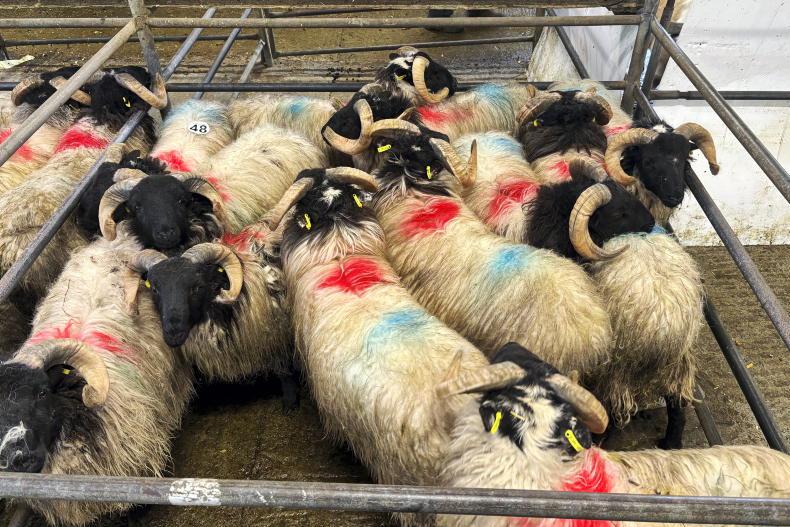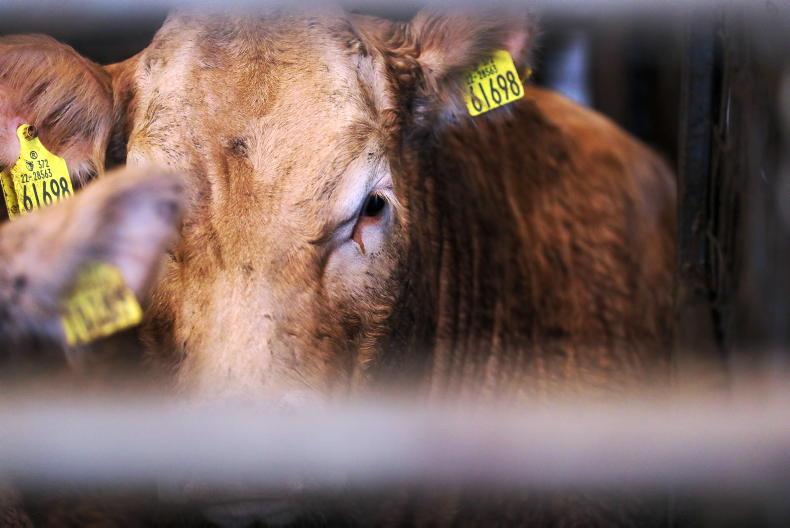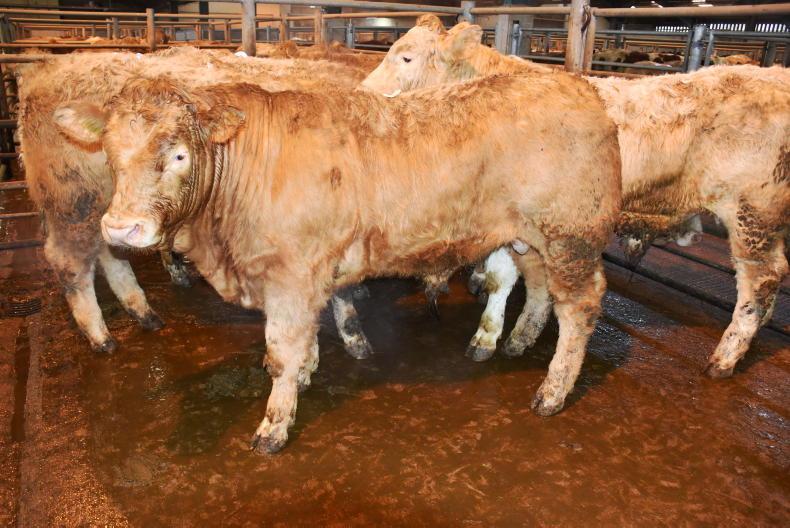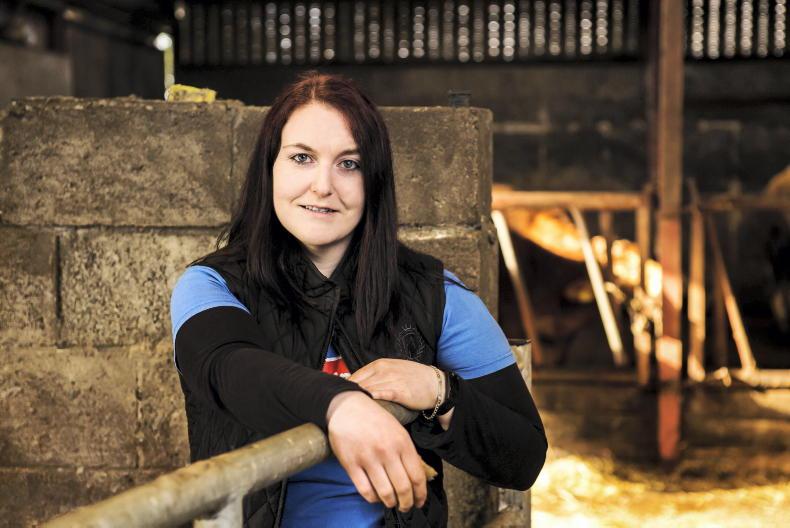This week’s mart trade came in a little steadier than the week previous. Drier weather has helped ground conditions in the west in particular and this has brought out some more grass buyers around the ring.
Taking a look at this week’s Irish Farmers Journal Martbdis analysis table, we see that it was the weanling rings that made the most of this week’s good weather, with prices up across the board.
Average-quality bull weanlings in the 300kg to 400kg weight bracket came in at €3.40/kg this week, up 14c/kg on the previous week.
Lighter bull calves also saw increases, with average bulls in the 200kg to 300kg weight bracket coming in at €3.29/kg this week.
Heifer weanlings also saw a steadier week’s trading, with average-quality heifers in the 300kg to 400kg weight bracket up 8c/kg to €3.10/kg.
Heavy heifers in the same quality bracket were up 24c/kg to €3.04/kg.
Average-quality heifers in the 500kg to 600kg weight bracket came in 3c/kg lower at €2.81/kg this week.
Mart managers are pointing to concerns for the back end supply for weanlings, with huge numbers of autumn-born calves currently sold in marts.
The dry cow trade continues to be buoyant with factory agents again underpinning the trade in marts this week. Heavy young continental cows continue to trade at prices of up to €2.90/kg. In the main, good-quality suckler cows that are well fleshed are trading from €2.40/kg to €2.80/kg.
Lighter suckler cows requiring some feeding are back at €2.00/kg to €2.40/kg.
Well-fleshed dairy cows are hitting highs of €2.30/kg to €2.50/kg, while lighter parlour cows lacking flesh are back at €1.00/kg to €1.50/kg, depending on weight, age and flesh cover.
The Ganado Express has docked in Greenore Port and is set to be loaded with weanlings by Viastar in the next few days.
This ship was called up at short notice after the Sarah M wasn’t allowed load in Greenore two weeks ago due to EU sanctions not allowing any boat with connections to Russia dock in an EU port.
Live exports continue to perform strongly, with store cattle exports up 2,781 head or 42.5% ahead of the same period in 2023.
Finished cattle exports have also seen a resurgence in 2024, with 4,203 extra finished cattle exported so far in 2024, a rise of 37.3%.
Calves are the only negative story when it comes to exports in 2024, with 19,383 fewer calves exported in 2024, a drop of 8.7%.
Reduced demand in the Netherlands has been the big driver of this, with almost 30,000 fewer calves making making their way there in 2024 compared with the same period in 2023.
The Spanish market has also been very solid, with 44,575 cattle exported to Spain, mainly beef-sired calves from the dairy herd, so far in 2024. This is up 10% on 2023 exports.
The trade with the UK has also gotten off to a firm start with 18,992 (+11%) cattle making the journey to Northern Ireland where tighter cattle supplies and firm demand for beef are underpinning demand.
This week’s mart trade came in a little steadier than the week previous. Drier weather has helped ground conditions in the west in particular and this has brought out some more grass buyers around the ring.
Taking a look at this week’s Irish Farmers Journal Martbdis analysis table, we see that it was the weanling rings that made the most of this week’s good weather, with prices up across the board.
Average-quality bull weanlings in the 300kg to 400kg weight bracket came in at €3.40/kg this week, up 14c/kg on the previous week.
Lighter bull calves also saw increases, with average bulls in the 200kg to 300kg weight bracket coming in at €3.29/kg this week.
Heifer weanlings also saw a steadier week’s trading, with average-quality heifers in the 300kg to 400kg weight bracket up 8c/kg to €3.10/kg.
Heavy heifers in the same quality bracket were up 24c/kg to €3.04/kg.
Average-quality heifers in the 500kg to 600kg weight bracket came in 3c/kg lower at €2.81/kg this week.
Mart managers are pointing to concerns for the back end supply for weanlings, with huge numbers of autumn-born calves currently sold in marts.
The dry cow trade continues to be buoyant with factory agents again underpinning the trade in marts this week. Heavy young continental cows continue to trade at prices of up to €2.90/kg. In the main, good-quality suckler cows that are well fleshed are trading from €2.40/kg to €2.80/kg.
Lighter suckler cows requiring some feeding are back at €2.00/kg to €2.40/kg.
Well-fleshed dairy cows are hitting highs of €2.30/kg to €2.50/kg, while lighter parlour cows lacking flesh are back at €1.00/kg to €1.50/kg, depending on weight, age and flesh cover.
The Ganado Express has docked in Greenore Port and is set to be loaded with weanlings by Viastar in the next few days.
This ship was called up at short notice after the Sarah M wasn’t allowed load in Greenore two weeks ago due to EU sanctions not allowing any boat with connections to Russia dock in an EU port.
Live exports continue to perform strongly, with store cattle exports up 2,781 head or 42.5% ahead of the same period in 2023.
Finished cattle exports have also seen a resurgence in 2024, with 4,203 extra finished cattle exported so far in 2024, a rise of 37.3%.
Calves are the only negative story when it comes to exports in 2024, with 19,383 fewer calves exported in 2024, a drop of 8.7%.
Reduced demand in the Netherlands has been the big driver of this, with almost 30,000 fewer calves making making their way there in 2024 compared with the same period in 2023.
The Spanish market has also been very solid, with 44,575 cattle exported to Spain, mainly beef-sired calves from the dairy herd, so far in 2024. This is up 10% on 2023 exports.
The trade with the UK has also gotten off to a firm start with 18,992 (+11%) cattle making the journey to Northern Ireland where tighter cattle supplies and firm demand for beef are underpinning demand.










SHARING OPTIONS